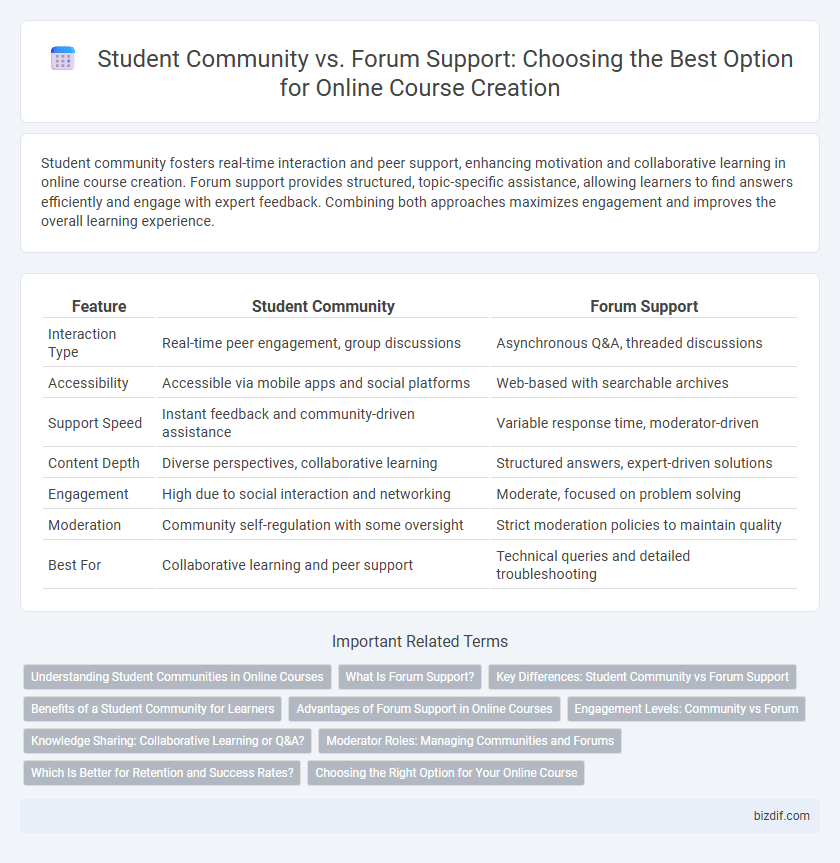Student community fosters real-time interaction and peer support, enhancing motivation and collaborative learning in online course creation. Forum support provides structured, topic-specific assistance, allowing learners to find answers efficiently and engage with expert feedback. Combining both approaches maximizes engagement and improves the overall learning experience.
Table of Comparison
| Feature | Student Community | Forum Support |
|---|---|---|
| Interaction Type | Real-time peer engagement, group discussions | Asynchronous Q&A, threaded discussions |
| Accessibility | Accessible via mobile apps and social platforms | Web-based with searchable archives |
| Support Speed | Instant feedback and community-driven assistance | Variable response time, moderator-driven |
| Content Depth | Diverse perspectives, collaborative learning | Structured answers, expert-driven solutions |
| Engagement | High due to social interaction and networking | Moderate, focused on problem solving |
| Moderation | Community self-regulation with some oversight | Strict moderation policies to maintain quality |
| Best For | Collaborative learning and peer support | Technical queries and detailed troubleshooting |
Understanding Student Communities in Online Courses
Student communities in online courses foster interactive peer-to-peer learning, enhancing engagement and motivation compared to traditional forum support, which often remains passive and instructor-focused. Active communities enable real-time discussion, collaboration, and networking, creating a dynamic learning environment that encourages knowledge sharing and problem-solving. Integrating student communities into course platforms significantly improves retention rates and overall learner satisfaction by promoting a sense of belonging and continuous interaction.
What Is Forum Support?
Forum support refers to a structured online platform where students can post questions, share resources, and engage in discussions related to course content. It provides a centralized space for asynchronous communication, enabling learners to find solutions through peer interaction and expert moderation. Unlike a student community, forum support is often more focused on problem-solving and knowledge exchange within the course context.
Key Differences: Student Community vs Forum Support
Student community offers interactive engagement with peers and instructors, fostering real-time collaboration and networking opportunities, while forum support primarily provides asynchronous, text-based problem-solving and knowledge exchange. Student communities often include multimedia communication tools such as live chats, video calls, and social posts, enhancing social learning dynamics compared to forums' linear thread formats. Forums suit structured Q&A environments, whereas student communities support continuous motivation and personalized learning experiences critical for course completion rates.
Benefits of a Student Community for Learners
A student community fosters interactive learning by enabling peer-to-peer collaboration, real-time feedback, and shared experiences, significantly enhancing engagement and motivation. Unlike static forum support, a vibrant community offers continuous networking opportunities, personalized help, and emotional encouragement, which contribute to higher course completion rates. This dynamic environment cultivates a sense of belonging and accountability that empowers learners to achieve their educational goals more effectively.
Advantages of Forum Support in Online Courses
Forum support in online courses offers asynchronous communication, allowing students to engage at their convenience, which enhances accessibility and flexibility. It promotes organized, searchable discussions that facilitate knowledge retention and resource sharing, benefiting both current and future students. Unlike student communities, forum support provides structured interaction moderated by instructors, ensuring accurate information and timely assistance.
Engagement Levels: Community vs Forum
Student communities foster higher engagement levels by enabling real-time interaction, peer support, and collaborative learning, which enhances motivation and knowledge retention. Forums, while useful for structured discussions and asynchronous support, often suffer from delayed responses and lower participation rates. Active communities drive continuous engagement through dynamic content sharing, events, and direct communication, creating a more immersive learning environment.
Knowledge Sharing: Collaborative Learning or Q&A?
Student communities foster collaborative learning by enabling peer-to-peer interaction, shared resources, and collective problem-solving, enhancing deep knowledge exchange. Forum support primarily serves as a structured Q&A platform, where learners seek specific answers and instructors provide expert feedback. Combining both approaches maximizes knowledge retention and engagement in online course creation.
Moderator Roles: Managing Communities and Forums
Moderator roles in student communities involve fostering engagement, maintaining a positive learning environment, and facilitating peer-to-peer interaction, which enhances collaborative learning outcomes. In forum support, moderators focus on organizing discussions, enforcing guidelines, and promptly addressing queries to ensure effective knowledge exchange and minimize misinformation. Effective moderation in both settings boosts student satisfaction, retention rates, and the overall success of online course platforms.
Which Is Better for Retention and Success Rates?
Student communities foster interactive learning environments that enhance engagement through peer collaboration, boosting retention and success rates compared to traditional forum support. Active participation in student communities encourages accountability and real-time feedback, which are critical for maintaining motivation during online courses. In contrast, forum support often lacks immediacy and personalized interaction, making student communities the superior choice for improving educational outcomes.
Choosing the Right Option for Your Online Course
Student community platforms foster interactive peer-to-peer learning and collaboration, enhancing engagement through real-time discussions, group projects, and social interaction. Forum support, while structured and easy to moderate, offers asynchronous communication that is ideal for organized knowledge sharing and long-term resource access. Selecting the right option depends on your course goals, with communities suited for dynamic, social learning environments and forums optimized for structured problem-solving and support.
Student community vs Forum support Infographic

 bizdif.com
bizdif.com